Nancy Cooper 1820 – 1883 Benjamin Simpson 3/29/1818 – 5/17/1910
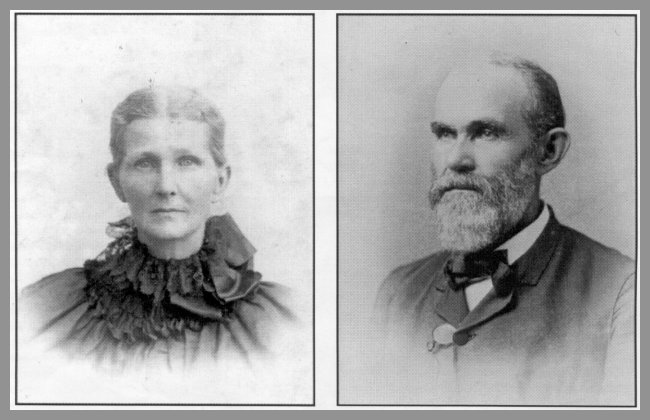
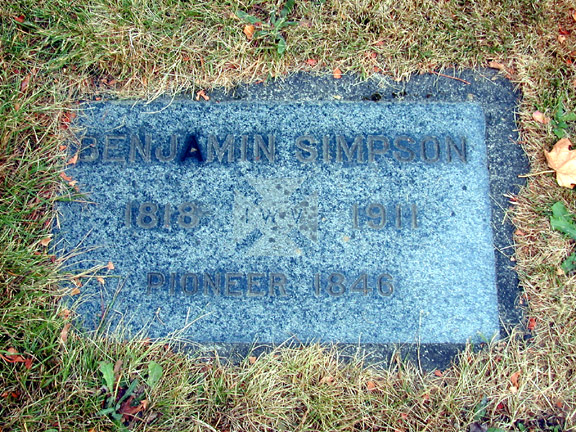
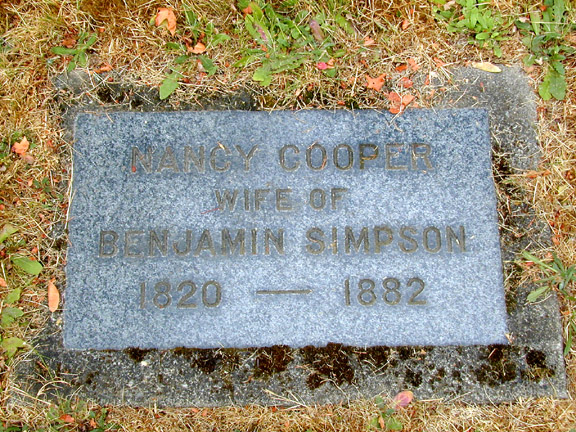
Gravestones of Benjamin and Nancy Simpson in the Lone Fir Cemetery, 2115 SE Morrison St. Portland, Oregon.
Biography of Benjamin Simpson
The following was compiled from three newspaper articles: The first in the Hillsboro Independent on November 17, 1905, the second and third in unidentified papers, published March 29, 1910 and May 18, 1910.
Benjamin Simpson was born in Warren County, near Nashville, Tennessee, on March 29th, 1818, but was taken by his parents to Missouri in 1820, and lived there until he left for Oregon in 1846. In 1839 he married Eliza Jane Wisdom, who died in 1841, shortly after the birth of their first son John Thomas. He was married again in 1843 to Nancy Cooper, and with three children, John Thomas, Sylvester C. and Samuel L. crossed the plains and settled on French Prairie in Marion County, Oregon in 1846. This was the same year the United States established its claim to the Oregon country by treaty with Great Britain. Ben’s brother Barnett, reported in a newspaper article written years later, that Ben had been elected Captain of the wagon train that brought the family west. Barnett also noted that between their arrival in Oregon in 1846, and 1852, three of Ben Simpson’s brothers married three sisters of the Haven family.
After the massacre of Dr. & Mrs. Whitman in 1847, at Wailatpu, near Walla Walla, Washington, Benjamin volunteered as a member of the force sent from the Willamette settlement under Colonel Gilliam to quell and punish the Cayuse Indians, and was present at the death of Colonel Gilliam which resulted from the accidental discharge of a gun. This action against the Indians was called the Cayuse War.
Benjamin Simpson built one of the early steamboats to ply the Willamette River above Oregon City. At Clackamas he owned a sawmill and at Oregon City, a merchandise store. In 1849 he made a voyage to California with a cargo of lumber which was used to build sluice boxes for mining gold. Lumber at that time was worth $150 to $250 per thousand board feet. He also shipped knock-down houses which sold in San Francisco for $1000 each. In short order he amassed quite a fortune.
In 1850, Benjamin Simpson was elected a member of the Second Territorial Legislature, and served with credit to himself and his constituents. During the course of his political career he was elected six times to the State Legislature, four times to the State House of Representatives after Oregon became a state, and once to the State Senate from the counties of Marion, Clackamas, Polk and Benton. While he was a democrat during his early life, with the firing on Fort Sumpter early in 1861, he became a Union man, and after the close of the Civil War, identified himself with the Republican Party.
About 1856, Ben was sulter at Fort Yamhill, Polk County. It was during this time that he formed the acquaintance of Second Lieutenant Philip H. Sheridan, and when the latter left Oregon in 1861, expressing a desire to “attain the rank of captain before the (Civil) war ended,” he placed all his business affairs in Mr. Simpson’s hands. (Sheridan gave his sword to Ben; this sword is now in the possession of David Healy.)
.
An additional note from David Healy regarding Benjamin Simpson and the crossing of the Oregon Trail:

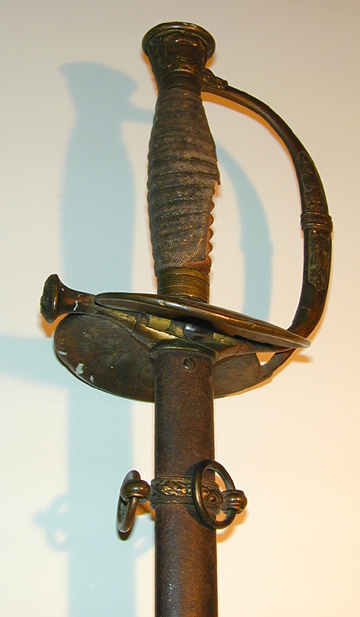
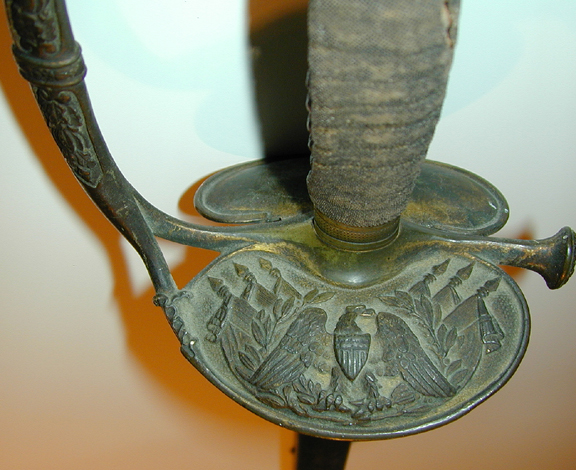
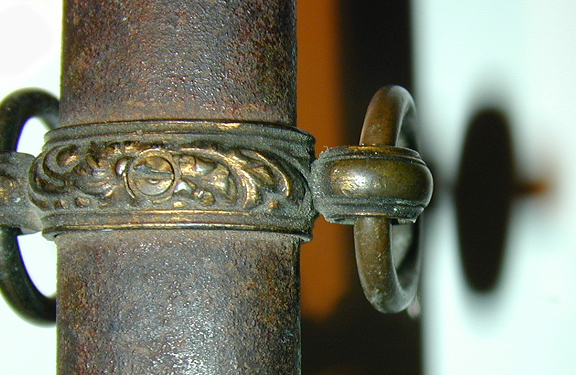
Second Lieutenant Philip H. Sheridan’s sword.
Ben Simpson was Indian Agent at the Siletz and Grande Ronde reservations for eight years, beginning in 1862 by appointment of President Lincoln. After the Civil War, he was appointed by President Grant to be chairman of the “Committee of Three” which negotiated a treaty with the Coeur d’Alene Indians.
In 1875, he was appointed Surveyor General of Oregon by President Grant, and served out his term. After this appointment, Ben was frequently referred to as “General Simpson”
About 1880, Ben moved to Selma, Alabama where he received an appointment as Post Office Inspector and filled that role for nearly twenty years there. During his youth, Ben had learned from family lore that he had an uncle that had a large estate in Scotland. Not much attention was given to this, however, for many years. In about 1879, Ben happened to pick up a Scotch paper in Oregon in which appeared a notice to the effect that there was a large estate in Scotland that was about to escheat to the crown, because no one could be found who could prove his rightful ownership thereunto, and stating furthermore, that it was believed there were heirs in the southern part of the United States. This accidental finding of a reference to the Simpson estate in Scotland recalled the tradition to the same effect of his early childhood. Ben Simpson secured the Post Office Inspector position in the south with the intention of establishing his claim to the estate, which, upon investigation he learned was valued at several millions of dollars. After a number of years of strenuous effort, he abandoned the project, because the kind of evidence required could not be found. He satisfied himself however, that he was the legitimate heir, and that he could have proved his claim had it not been for the destruction of family papers by fire. While there he married Caroline Gordon; Nancy apparently having died sometime prior.
He and Caroline returned to Oregon to the home of his daughter and son-in-law, W. M. Killingsworth, at 229 Alberta Street, Portland, Oregon, about 1900. Ben Simpson died on May 17, 1910, at the age of 92, three weeks after he fell over an obstacle on the floor in his bedroom and broke his left arm, while preparing for bed. The following morning complications developed and he passed away three weeks later. The funeral was held at the Finley Undertaking Rooms, and Ben was buried in the Lone Fir Cemetery in Portland, Oregon.
Ben Simpson was the founder of a well-known family in Oregon. His sons were: Samuel L. Simpson, famed poet and author of “Beautiful Willamette”; Sylvester C. Simpson, long time editor of the Oregon Herald of Portland, State Superintendent of Public Instruction 1873-74, subsequently a historical and legal writer for the Bancroft Company; Grover Simpson, a high officer of the Wells-Fargo Company in Chicago; William Simpson, of Pocatello, Idaho; John Simpson of Sheridan, Oregon: and Clarence, industrial agent of the Wells-Fargo Company in New Orleans. He was survived by two daughters: Mrs. W. M. Killingsworth and Mrs. W. T. Burney, of Portland.
From a newspaper article written March 29, 1910, “General Simpson was one of the most vigorous characters in early Oregon affairs, and his native energy stays with him even in his advanced age. “Time that scars us, maims and mars us,” as Sam Simpson wrote in his most noted poem, has not impaired the mind of this pioneer and he still has active use of his physical faculties. In industry, Indian fighting, politics and commonwealth building, General Simpson left his mark on the affairs of Oregon.
From notes of Kirke Wilson, May, 1991:
Benjamin Simpson (1818-1910)
m. Elmira Jane Wisdom who died in child birth in Platte Co.
m. Nancy Cooper (1820-1883) daughter of William Cooper, gd’ of Col. Benjamin Cooper of 1782 Blue Lick Fight in Kentucky and Coopers Fort, Missouri, ggd of Francis Cooper of Culpeper Co, Virginia 6 sons/4 daughters 1844-1865, first child, Sylvester Confucius b. 1844, Platte Co, Missouri across Oregon Trail to Oregon 1846, lived in several places in Oregon, Benjamin active in business, politics and
government after death of Nancy in 1883, Benjamin moved to Selma, Alabama area briefly, returned to Oregon and married Mrs. Caroline Gordon (about whom little is known)
____________________________________________________________________
From notes of Lynn Beedle (“Old Times, Vol. 24, No. 1, August 23, 1995):
“It’s evident that Ben Simpson was a man of many talents — and many jobs. He was an entrepreneur, sometimes legislator, politically inclined. He was a postal inspector. His last job was as Surveyor General. In 1865 he bought a newspaper in order to promote himself for a political position. Hired sons Sylvester and Sam as editors.”
Ben wrote an 1897 letter of Sylvester (from Selma, Alabama). Only about 80% accurate, but certainly his comments that he knew President McKinley well are accurate.
Copy of a letter from Benjamin Simpson to son Sylvester C. Simpson and Family:
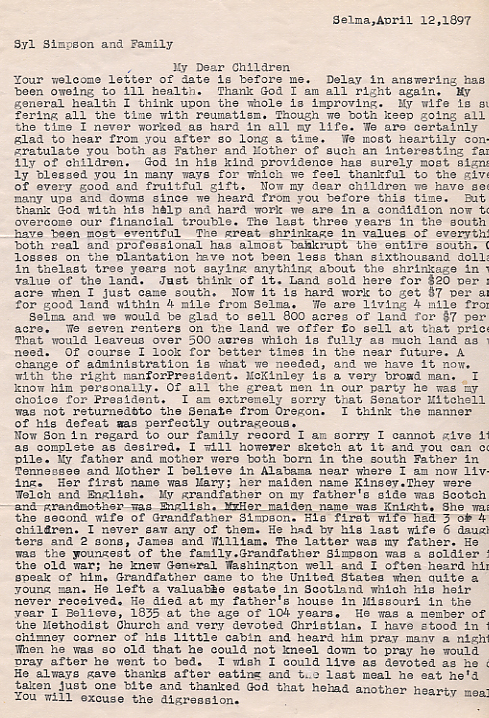
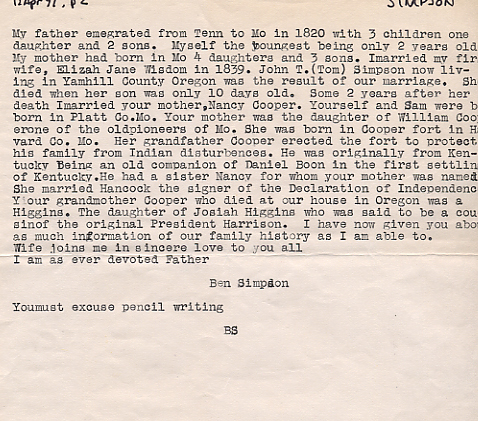
From website: http://freepages.history.rootsweb.com/~cchouk/oregon_trail/index1.htm
Benjamin Simpson was the son of my great great great grandfather William Simpson. William and his wife, Mary Kimsey Simpson must have had their hands full bringing their children and their families across the Oregon Trail. One daughter, Cassia Casey Simpson Kimsey, died on the journey; leaving a husband and 6 year old daughter. Nineveh Ford married William’s daughter Martha Jane Simpson June 15, 1848 in Marion County, OR.
ID: I00030 | |||||
Name: Benjamin F. Simpson | |||||
Sex: M | |||||
Birth: 29 MAR 1818 in Warren Co., TN | |||||
Death: 17 MAY 1910 in Portland, Multnomah Co., OR | |||||
Note: Crossed the Oregon Trail with wife and his parents in 1846 Father: William Barnett Simpson b: 27 JUN 1793 in Warren Co., TN Marriage 1 Caroline Gordon b: ABT. 1818 Marriage 2 Elmira Elzira Jane Wisdom b: ABT. 1818
Children
Marriage 3 Nancy Cooper b: 29 MAR 1820 in Howard Co., MO
Children
From website: http://worldconnect.genealogy.rootsweb.com/cgi-bin/igm.cgi?op= GET&db=cchouk&id=I00030 |
___________________________________
From: www.cowcreek.com/story/x01history/x11reslife.html
This article refers to Benjamin Simpson’s experience as an Indian Agent.
Reservation Life
Over 800 Indians arrived at the Grand Ronde Reservation….
… shown on Map 10. They were totally dependent on the Government for survival. The Indians were surrounded and protected by the U.S. Army. The Indians were held against their will, forbidden to leave, much as slaves are held. The Indians had no tools to build shelters.
The Indians had lost everything – lost a war, and their homes. They were homesick and many died of depression. Food stocks were uncertain and the crowding of so many people into such a small area meant game quickly became scarce. Only treaty Indians were eligible for government food rations. Even the Government food supply was not guaranteed. The majority, non-Treaty Indians, were faced with starvation.
Education on the reservation was intended to destroy the Indian’s old way of life, to indoctrinate them into the ways of the non-Indian. Agent Benjamin Simpson likened educating “a mind that inhabits a savage body” to “putting new wine into old bottles.”
“Mind and body must be civilized at the same time, and while the one is being stored with useful knowledge the other must be taught sober, steady, industrious habits; under such a system, not only will the pupils benefit, but they will contribute largely by their influence and example toward the elevation of their races from its barbarous condition.”
Many starving, homesick Indians, desperate for their homelands, escaped from the Reservation and tried to go home. Most were tracked down and returned to the reservation.
____________________________________________________________________________
Seems Benjamin Simpson was also involved in resolving shellfish rights. This is
from: http://users.wi.net/~maracon/lesson8.html
The Yaquina Bay oyster industry began with a shipwreck. In January 1852, the schooner Juliet was forced by storms, and her captain and crew were stranded in in this area for two months. When they reached the Willamette Valley, the captain reported that the Yaquina River was abundant with oysters, clams and fish of all kinds.
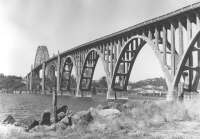
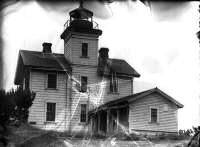

On September 14th, 2003, David Healy found this on http://homepages.rootsweb.com/~westklic/ella.html.
The Klickitat County News, Goldendale, WA., July 25, 1935, page 4
INTERESTING PIONEER INTERVIEWS
Mrs. Ella (Short) Shell, well known pioneer of this the city, and now residing at Boardman, Oregon, was a recent visitor here and during her stay attended a meeting of the Klickitat Valley Pioneer Association. In an interview with Mrs. Shell, she said:
“My mother (Louisa Anderson Short) crossed the plains to Oregon in an immigrant train of covered wagons in 1846, when nine years of age. The train she came in was headed by Captain Ben Simpson, my mother’s uncle. Her maiden name was Louisa Anderson. Her mother, Eleanor Simpson, married James Anderson. To their union was born nine children, five boys and four girls, namely: John, Harvey, Thomas, and Milton and one boy that died when in early manhood. The girls were Mary, Louisa, Nancy and Hannah. None of the latter are now living.
Ben Simpson, who was the captain of the train my mother was with, was a remarkable character in many respects. He was quite financier and it seemed perfectly natural for him to make money as he made and lost several fortunes during his lifetime and held many responsible positions after coming to Oregon and attained the advanced age of 95. He had three boys and two girls. The boys’ names were John, William, (both lawyers) and Samuel Simpson, the poet. He was called “Oregon’s Beloved Poet.” He was the author of many beautiful poems, among them being “Beautiful Willamette” which poem many of those who may chance to see this will recall.
“I remember of hearing my mother tell of their experiences while crossing the plains. In those days, the Indians were quite dangerous and many immigrants had been killed both before and after the year in which she made the previous journey. Their train was composed of many wagons drawn by ox teams.
“At one time they received a great scare as they saw in the distance a band of Indians on horseback coming at great speed towards them. The captain, as well as the rest, perceived the danger but he was cool-headed and of great nerve and proceeded at once to order the men of his company. He told them to put all of the women and children in a group in the center and surround them with the wagons and the men would defend them the best that they could. His orders were rapidly put into execution and all was ready when the Indians arrived.
“The Indians they saw in the distance did not overtake them at once but kept at a safe distance of the wagons and followed the wagons for three days and when they finally overtook them the captain of the train demanded of the chief an explanation of why they are following them, when the chief replied that they wanted permission to dance for them and also wanted a dinner (which was soon prepared by the women of the train) they were also told that they might dance after which they rode away not molesting the immigrants in any way.
“At another time they saw a large number of Indians coming in every direction which sent terror to every heart as they expected to be surrounded and murdered but to their great surprise and relief, they found that it was not them they were after but a huge band of Buffalo which was quickly surrounded and slaughtered as they were all well armed.
“Another instance that she told of that the children becoming tired of riding so long were permitted to get out of the wagon and walk awhile. However, they played and loitered alone until the wagon train got out of sight. And they, becoming confused, got on to a by-trail which led them away from the main road and they believed themselves lost.
“The immigrants, in the train ahead, looked back and could see nothing of them so some of the man on horseback went back to look for them. They soon found them, much frightened, and they accompanied the horsemen to the wagons, a wiser bunch of youngsters for their experience, for they had no desire to loiter behind out of sight of the train after that.
“Mother’s father, with the family, settled in the Willamette valley where he took up a claim and resided the remainder of his life. Captain Ben Simpson also settled in some part of Oregon, the latter part of his life being spent in Portland. Will Simpson practiced law in Portland a number of years as did John in Sheridan, Oregon.
“The two Simpson girls married wealthy men. One married Mr. Killingsworth of Portland and the other married Mr. Berney of Portland, also. Their son, Ben Berney, was also a lawyer. My mother was married to Merle Short June 16, 1859. He was a young school teacher at that time, teaching in the neighborhood at Silverton, Oregon. To their union was born nine children, six boys and three girls.”
[HOME]
© Jeffrey L. Elmer
Lorem ipsum dolor sit amet, consectetur adipiscing elit. Ut elit tellus, luctus nec ullamcorper mattis, pulvinar dapibus leo.